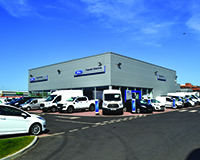 Car sales are booming. Last year broke all records. Despite a small cooling in July there were still 178,500 cars sold by dealers across the UK.
Car sales are booming. Last year broke all records. Despite a small cooling in July there were still 178,500 cars sold by dealers across the UK.
It is a sign as to why property investors might want to look at the automotive and roadside industry as a place to splash some cash.
Dealerships
With 4,500 franchise dealerships across the UK, including some big names you may never have heard of, each tied to a car manufacturer demanding high standards on showrooms, there are plenty of potential investments.
Meanwhile, oil companies have sold large portfolios of petrol forecourts, and the white whale of the industry – a massive motorway service station or two – could one day surface for the luckiest and largest investors to snare.
Investors buying more traditional property might typically look at location, covenant and building future-proofing. Should they do the same if investing in the more specialist automotive sector?
“Motor retail can tick all of those boxes,” says Bill Bexson, managing director of the Automotive Property Consultancy. “We can provide good main road location sites, often with good alternative use. We are essentially providing simple steel-frame buildings which have great adaptability and certainly 50-year life spans from my experience.”
“We are seeing lots of demand, a relative shortage of prime stock,” adds Paul Taylor, head of automotive at Bilfinger GVA. “It is an attractive asset class as the occupational market is bullish and has been for probably four years.”
Adam Chapman, Knight Frank’s head of automotive, says the sector has benefited from investor interest as it is typified by long leases with fixed uplifts and a strong tenant base.
Dealership brands can match onto property values and rents too, giving a clue as to where to invest, with prestige brands selling for greater profit and paying greater rents.
At a typical dealership, new car sales represent about 27% of profit for dealers, used car sales about 34% and after-sales vehicle servicing and other services the rest.
If there is a downturn and a reduction in the growth of new car sales, dealers can keep profits up, restoring margins by selling more used cars where they can control the price margins themselves as well as up-sell more financing deals.
And while there is consolidation in the sector – numbers of dealerships have shrunk from 6,500 a decade ago to 4,500 today – demand still outstrips supply, especially in the south of England.
But there are opportunities to look out for.
Bilfinger GVA’s Taylor says proactive investors would do well to team up with manufacturers to acquire sites and take on a development role. Knight Frank’s Chapman recommends keeping an eye on new manufacturers – particularly in the electric car sector – which could provide an unexpected uplift.
Petrol stations
Petrol stations, which were once owned by the big petrol companies, have largely been sold off. There are around 8,500 petrol stations in the UK. Most are owned by companies including Gerald Ronson’s Rontech or Eurogarages, but still publicly branded as Shell or BP.
The big sell-offs, which began with Total putting up its entire estate of almost 500 forecourts in 2010, led to a flurry of US private equity money, including Texas-based Lone Star buying Britain’s largest independent petrol station business MRH for more than £1bn in January 2016.
Smaller individual and clusters of sites tend to attract high net worth individuals, foreign buyers, typically Middle Eastern, or small councils looking for pension fund investments. The average lot size for these is between £3m and £5m.
Motorway service stations
These are the white whales of the industry with only about 75 in the UK and are seen as extremely defensive investments. Motorway drivers have little choice but to stop at them for petrol or a rest, and another one cannot be built around the corner due to hefty planning restrictions, making them almost immune to inflation or economic pressure.
Demand is likely to always outstrip supply too as achieving planning for service stations is a long, troublesome and not always successful process.
But, for the lucky investors that do have service stations in their portfolios, Knight Frank’s Chapman says there is opportunity for lucrative asset management.
“There is huge potential for quality to improve as quite a lot are 1970s first-generation sites that really need some investment,” he says.

Key deals
Asset: Ford Commercial Vehicles – Dagenham
Vendor: AXA
Purchaser: Aberdeen Asset Management
Price paid: £6.6m
Yield: 4.57%
Reason for purchase: New-build development in South East location and UK homeland of the brand. Long-term income with RPI-linked rental uplifts.
Advisers: Knight Frank/Rapleys
Asset: Land Rover, Honda and Mazda dealerships in Tyburn, Erdington and Birmingham
Vendor: Lancaster (Jardine)
Purchaser: Knight Frank Investment Management
Price paid: £17m
Yield: 4.74%
Reason for purchase: Secure long-term income. High-quality properties. Fixed rental uplifts.
Advisers: Knight Frank/Bilfinger GVA
Asset: Nissan Cribbs Causeway, Bristol
Vendor: Goodman Group
Purchaser: Aviva
Price paid: £6m
Yield: 4.58%
Reason for purchase: New-build development in prime location. Secure long-term income let to manufacturer covenant.
Advisers: Automotive Property Consultancy for Goodman; Knight Frank for Aviva
Assets: Woolley Edge Motorway Service Area, Wakefield, Yorkshire
Vendor: Cayman Island Trust
Purchaser: Orchard Street Investment Management
Price paid: £35.1m
Yield: 6.82%
Reason for purchase: Opportunities in this highly defensive sector are extremely rare. Provided uncapped annual RPI-linked uplifts. Re-gear potential.
Advisers: Knight Frank/Cushman & Wakefield
Asset: Juice Portfolio – 14 Petrol Filling Stations – nationwide
Vendor: Arium
Purchaser: Investra
Price paid: £31m
Yield: 6.37%
Rationale: Modern sites providing fixed 2% per annum rental uplifts. Strong asset management opportunities and enhanced break-up value.
Advisers: Knight Frank/Gerald Eve
• To send feedback, email david.lindsell@estatesgazette.com or tweet @DavidLinsellEG or @estatesgazette










